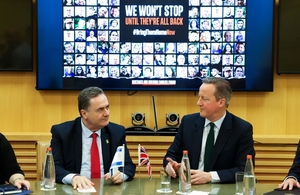Foreign Secretary in Middle East and Turkey to progress sustainable Gaza ceasefire
Lord Cameron will visit Israel, the Occupied Palestinian Territories, Qatar and Turkey to urge regional leaders to work with the UK to achieve a sustainable ceasefire in Gaza

The Foreign Secretary with the Israeli Minister for Foreign Affairs Israel Katz in Jerusalem, during his visit to the Middle East.
- Foreign Secretary to visit Israel, the Occupied Palestinian Territories, Qatar and Turkey to hold high-level talks with regional leaders to get more aid into Gaza, hostages out and reach a sustainable, permanent ceasefire.
- David Cameron will focus on advancing discussions with the Israelis and Qataris for an urgent humanitarian pause in Gaza
- He will build on efforts to secure the safe release of hostages, pushing forward the cases of British and dual nationals through all diplomatic routes.
The Foreign Secretary travels to the Middle East and Turkey this week where he will urge regional leaders to work with the UK to achieve a sustainable ceasefire in Gaza, so that Israelis and Palestinians can build a peaceful future together.
The Prime Minister and Foreign Secretary have set out the necessary elements for progress – Hamas must agree to the release of all hostages, they can no longer be in charge of Gaza and the threat from their terror and rocket attacks must end. An agreement must also be put in place for the Palestinian Authority to return to Gaza in order to provide governance and services and, increasingly, security.
In Israel, the Foreign Secretary will speak to Prime Minister Netanyahu and Foreign Minister Katz, calling for more to be done, more quickly to significantly increase the flow of life-saving aid into Gaza. He is also expected to raise UK concerns over the high number of civilian causalities.
The Foreign Secretary will reiterate that more crossing points need to be open for longer for aid deliveries to Gaza, including the port at Ashdod and the Kerem Shalom crossing, and that water, fuel and electricity must be restored during his meetings.
Foreign Secretary David Cameron said:
No-one wants to see this conflict go on a moment longer than necessary. An immediate pause is now necessary to get aid in and hostages out. The situation is desperate.
This week I am in the Middle East working with partners to help build a plan to move from that pause to a sustainable, permanent ceasefire without a return to hostilities.
Such a plan would require Hamas to agree to the release of all hostages, Hamas to no longer be in charge of Gaza launching rocket attacks at Israel, and an agreement in place for the Palestinian Authority to return to Gaza in order to provide governance and services and, increasingly, security.
The Foreign Secretary will also meet with President Abbas and will highlight the UK’s long-term support for a two-state solution so that Israelis and Palestinians can live side-by-side in peace.
In Qatar, David Cameron will see first-hand UK-Qatar co-operation to get more humanitarian aid into Gaza for those who need it most, and meet counterparts to discuss how the two countries can work more closely together to do even more.
He will also hold detailed talks on efforts to secure the safe release of hostages, pressing the cases of British and dual nationals through as many diplomatic channels possible.
Qatar has been a key mediator throughout the conflict to allow for the release of hostages. It is important the UK continues to work with Qatar, and others in the region, to secure a sustainable ceasefire and the release of all further hostages held by Hamas.
The UK is working with both Qatar and Turkey to address regional instability, seeking the safe return of hostages, working together to tackle terrorism and support those affected by conflict.
In Turkey, the Foreign Secretary will meet Turkish Government leaders to discuss regional security in the Middle East alongside a range of other shared challenges. The UK and Turkey have a close partnership and will continue our essential work on tackling terrorism and illegal migration and shoring up support for NATO and Ukraine.
Media enquiries
Email [email protected]
Telephone 020 7008 3100
Contact the FCDO Communication Team via email (monitored 24 hours a day) in the first instance, and we will respond as soon as possible.
Updates to this page
Published 24 January 2024Last updated 25 January 2024 + show all updates
-
Added translation
-
First published.